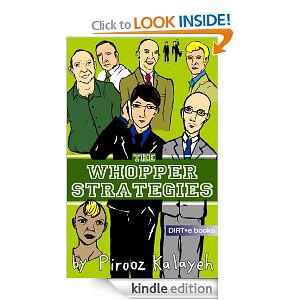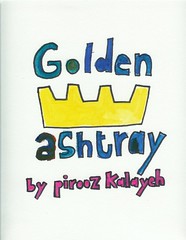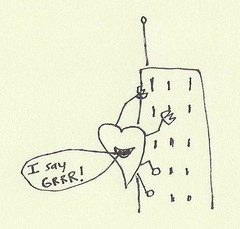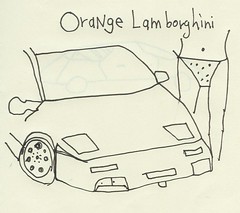 ARAM SAROYAN
ARAM SAROYAN is an internationally known poet, novelist, biographer, memoirist and playwright. His most recent publication with
Ugly Duckling Presse,
Complete Minimal Poems, includes the entire contents of
Aram Saroyan (Random House, 1968),
Pages (Random House, 1969),
The Rest (Telegraph, 1971), as well as Saroyan’s contribution, “Electric Poems,” to the anthology
All Stars (Goliard-Grossman, 1972), and a sequence, “Short Poems,” which hasn’t appeared previously.
For the past couple weeks, we were able to chat about
CMP, and some of the other works he has completed throughout his career. Of course, it wasn't done in a typical interview format. I didn't really know where we would end up, when Aram said to frame our discussion with several cartoon captions from The New Yorker. I just figured it'd be fun. I think that's what I love about Aram the most. Everything he does is about play, but it's also about the play inside that play - a place he is searching for as well - that gets you turned in an opposite direction from where you thought you'd be. It's all about that journey. Something Aram takes us through in his poetry, plays, fiction, or even interviews, that turns the light on right from the word
go.
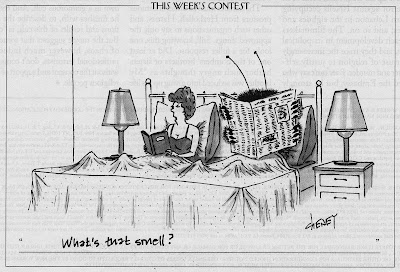 PK
PK: I just burned some white sage. I got it from the Farmer's Market in Hollywood. One little bushel of the stuff has lasted me an entire year out here in Korea. I burn it now and again in the morning.
(I would replace this caption with "Naked Lunch Meets Jungle Fever." Kafka could play the role of Denzel Washington. You could be the guy that brings him some bug spray. I would be the woman in bed with Kafka. I would complain in a supportive way. Then we would have a wedding in the third act. Kafka would quit the bug spray business. This caption would be a still from the last scene in the movie. I would go to snuggle with Kafka, but he would be dead. He needed something to live for. Life just wasn't worth living without a corporation.)
Words can change our experience with a visual image. In your poems, the word and image are simultaneously united. This blend creates an interesting shift in perception. In a sense, it requires a different way of looking, and that, for me, is a different way of being. I am often attracted to art that brings me such a moment of connection. Thank you for that.
I remember looking at a Jackson Pollock painting, and feeling a similar way. For one brief instant, there was a lack of thought. In that space, was the experience itself. It was akin to a "What's that smell?" moment. Of course, the "smell" was simply my previous conception of "looking" being dropped for some actual face-time with that moment.
Is this what you hope to achieve with your pieces? If so, how do you go about a poem's conception with such an intention in mind?
Aram Saroyan: I remember when I was a teenager my dad took me to the Museum of Modern Art in New York and I saw a work by
Franz Kline for the first time, and I thought, this guy has really gone out of his way to make something ugly. The ugliness is probably what shifts the way you think, or the way you are, for a moment—I think that’s what you’re talking about. The poems by me you refer to are probably the ones in Complete Minimal Poems and they’re now forty years old. When the book came out I read it through from cover to cover a couple of times and had a number of different ideas about it. One was, it’s about a young man in his room and at the door of his room.
I didn’t have any particular conception I wanted to get across when I wrote or when I write today. I think artists think with their work, not before they go to work. After I finish a piece, I always wonder, does this work.
Eventually, after many years (or maybe it was just a couple of years), I realized that Franz Kline’s work was the height of elegance. So it changed and/or I changed.
PK: I hear you. Franz Kline. I never went deep into his work. I remember seeing a couple pieces at the MOMA and The Philadelphia Museum of Art. I remembered that
Jean Michel Basquiat cited him as a big influence on his work. I didn't stop long enough to stick with him though. I was busy checking out
Cy Twombly. I didn't really like it, but I didn't dislike it either. I think seeing his pieces made me feel that kind of "ugly" you are referencing. I don't know though. I tend to see pretty in ugly and ugly in pretty. I don't know. I get so confused sometimes. It's not a bad confused, but simply a blending I suppose.
Were there any other visual artists that changed on you?
AS: I always loved
Warhol. And
Donald Judd. When I saw the first
Eric Fischel at a Whitney Biennial in the 80s I thought, oh, that’s ugly. I didn’t like it. And then, sure enough, of all the painters of that epoch like
Salle,
Schnabel, etc., I started to like his work the most. I think Schnabel’s movies, especially
Basquiat, are wonderful.
Warhol was such a great colorist, so inventive and elegant. I think I picked that up at an unconscious level. Later on you realize what it was that got you. His protégé, Basquiat, is also an extraordinary colorist. And sometimes he does great things with words. Like he has the word milk with a little copyright sign beside it. Exactly how insane our global corporate rigamarole has gotten.
When you live in New York, as I did, minimalism like Donald Judd’s work is terribly appealing. It balances the environment. I think I had to get out of New York to write differently. The environment is transgressive. Either that or I’m just a natural born country boy.
PK:
Genesis Angels: The Saga of Lew Welch and the Beat Generation is a fascinating book. It reads very much like fiction. In fact, there were several times where I wasn't quite sure. In fact, it almost reads like an autobiography. Why did you decide to write in this style? Was it to capture Lew in a way that a traditional biography couldn't?
AS: There’s a first draft of that book, a more traditional, rather academic biography, which I reread recently. There’s a lot of direct quotation from
Lew Welch—interviews and correspondence mostly—and that’s the best part of it. After I reread it I took some of the Lew Welch parts and made a solo performance play of it. It would be great I think for someone like Liev Schrieber or Joseph Fienes. But that first draft was, the Lew Welch quotes aside, a bit dull. So I rewrote it as a sort of Kerouac novel. Some of it is novelistic and/or autobiographical: I was trying to capture the spirit of Lew and the people around him, the Beats.
PK: You say a Kerouac novel, and I definitely feel that. There is that mad rush. At the same time, it's still very much you. I don't see Kerouac's long dash in continual use. You also vary the speed of your sentences by throwing in the occasional one or two-word sentence. Was this an intentional move? Was there a reason that you stayed away from the long dash continually and non-stop as Kerouac did?
AS: Kerouac was a writer I felt I had to come to terms with, and Genesis Angels was my moment of reckoning, so to speak. The book was written a chapter a day and not greatly edited by James Landis, my editor at Morrow. I suppose my technique is a little different, but the idea was to let go and write what came to mind. I started it right after my wife Gailyn gave me the verdict that the first draft was a tad dull. We were living in Bolinas and it was a beautiful day. I was crestfallen, but somehow energized too. As I walked back into the house to start the book again, I looked up the sky and thought to myself, “Just this blue” [meaning the color of the sky]. It’s interesting because the second draft written quickly in my version of Kerouac’s “spontaneous bop prosody,” told a more complex story than my first draft, which was ostensibly more reflective and took much longer to write. Probably I was laying the foundation, familiarizing myself with the story, so that I could then take off.
PK: You mention "Just this blue". That reminds me of Zen Master Seung Sahn. In his book, "Only Don't Know", he speaks of the clarity of one's moment being as simple as "Just like this".
http://www.kwanumzen.com/dssn/Was your recognition of the sky on that day linked to your experience or knowledge of Buddhism? If so, how has your experience with Zen informed your writing? Has it changed over time?
AS: I love that, “only don’t know.” It reminds me of one of my favorite words: though. Not too much baggage. As though you just turned a corner and encountered a new vista.
I’m an amateur, or really just a fan of Zen Buddhism. I was very impressed by “Zen Mind, Beginner’s Mind,” especially the part where he returns to his monastery after 25 years and discovers there are tears in his eyes.
PK: Zen is definitely interesting. I spoke to a monk who was one of Seung Sahn's students. He asked me why I write and to answer without words. "No words," he said. I knew that typically one answers those types of questions in the Zen tradition by pounding on the floor or what have you, but I felt like it would be a cop out, so I just said, "I don't know." I guess I could have followed Allen Ginsberg's "first thought, best thought" model, but I figured I could sit with the question a bit longer. That was when I asked him why he meditates. "For you," he said. I thought that was interesting. The whole "live for others" mentality. At the same time, he answered with words. Who knows where it all stands in the end? I could just end with a big, "I like questions though" and leave it at that.

How often do the questions you ask lead you into the work that you do? Do you find yourself trying to break a convention, or having a particular model before you begin something? Is it just a sentence? Or is it more like the "It's snowing" concept that you mention in your essay,
This Is It?
AS: I’m not sure about questions. Nor about breaking a convention. As a model, I suppose the mind is full of them and picking and choosing may take place at some pre-conscious level. But for me it begins with a word or a phrase or a sentence that has some generative dimension so that it begets another word or phrase or sentence, and on (or off) from there.
If you can try to locate
Ted Berrigan’s Interview with John Cage (reprinted in the American Literary Anthology 1)--it’s made up, a pastiche from many different sources (Cage, Warhol, Burroughs) as well as Berrigan himself, and it has some funny stuff about Zen. “Somebody should have kicked that monk’s butt”--or the equivalent.
PK: "Make love to the police. We need highly trained squads of lovemakers to go everywhere and make love."
That is very funny and so true! I remember walking through the streets of New York after 9-11. There was that same paranoia. I thought the same thought - not actually making love to New York's finest, but some sort of kindness to change things. I don't know. I guess I was feeling paranoia too. Maybe, we need an entire squadron of ass kickers and lovemakers side by side, kicking ass and making love, depending on how badly they want one or the other; and, of course, always providing the opposite of the desire, so that the lovemakers and hate mongers actually get a beating and a kiss, respectively, as well. I don't know. I am really as clueless as the monk who needs his ass kicked. Like, the other day, I was looking around my room. I saw everything in a particular order, and yet, at the same time there seemed to be a continual disorder going along as well. I don't know if this is because I spent the night reading
The Complete Minimalist Poems, or just because I find myself confused in each moment. It's like there's a new person everyday. I wake up. I look in the mirror and I have no idea. That's what I see: No idea. I wonder if writing is often "just like that." Like there's no writing as much as there is that building that " begets another word or phrase or sentence..." as you said; and how that building is very similar to acting - that moment where you piece together a character and see it push forward through the body, and then BOOM - there you are - outside and inside yourself, and you still don't know what happened.

I don't know if I make much sense. I like acting though. It is one of my favorite things to do; even though I have no idea what I'm doing when I do it.
Do you like acting?
AS: I’m a playwright, so I depend on people to love acting and to act, and I think you’re right: I learned that an actor has a process when my play “At the Beach House” was done in Los Angeles recently. It was a six week limited run, and the performances kept getting better and better as it went along. A certain moment in the play got illuminated by something two actors did together quite far into the run. It wasn’t in the text; it was them. I’d had staged readings of all my plays before but never a full production, and it’s very different. For a staged reading there are only a couple of rehearsals and then the performance with the actors holding their scripts. They don’t memorize the lines and go through the process of connecting the dots and having a character coalesce. It’s funny, certain actors would come in hot—seem to know everything from the beginning—but it might not deepen from there. Others might be that way, a quick study, and still keep building. I love the theater: if I were 30 years younger it would be my life. Now I must depend on others to do the heavy lifting I did for that first production, where I was in essence the line producer. Too much work! However, when it works I don’t think it gets any better for a writer.

About your room: my father always told me to keep my room clean and neat, and after a while I took his lesson to heart. But other people don’t mind a bit of (fertile) chaos, and actually he proved to be a packrat, so go figure.
PK: Yes, my room and mind go in waves of cleanliness and disruption. My latest coffee/computer mishap definitely put that to the test, as papers piled around the empty shell of what my computer once was. Of course, I could have taken a nap through the experience. Sometimes I find that's the best thing to do when the body is just plain tired. In fact, doing so, may have prevented the "coffee spill" in the first place. Who knows?
AS: That’s interesting about the nap. When I had a crisis in the production of the play—and they occurred regularly—if it was close to bed time I would have a choice between going crazy with being upset or going to sleep. My age definitely helped here. I would opt for going to sleep. And often in the meantime the theatrical team that had been assembled would solve the problem. That old saw about how the show must go on is really an ethic of a kind among certain show biz veterans, thank God.
I once spilled ink on a new desk (bought with part of my $500 NEA award for poetry back in the sixties). A friend had been doing drawings on the desk and left an open bottle of ink under some papers I was summarily cleaning up, the neatnik. So it can cut two ways.
PK: I really love the first act of
At the Beach House (that's all I could get online). It's got a quick pace. It's also radically different from your poetry or fiction, and, strikingly similar. There's the blend between fiction and reality again. It's almost as if you are pulling as much from real life, as you are the fictional transgressions that your writing voice might have carried you too.
AS: I’m so glad you like the play. It was such a kick to see it fully staged. It was like giving a party for six weeks. Writers don’t have that kind of good time very often I don’t think. As for real life and make believe, it’s a mix, a creative amalgam. These are people and circumstances I know but the chronology and the setting are different. And it all has a magnetic field of its own once it kicks in. The people talk and something happens because that’s the next thing that the nervous system of the writer wants to happen. “First thought, best thought,” as Allen Ginsberg told us.
PK: It also captures L.A. really well. I have been to those beach houses, and I have seen those young upstarts trying to manuever into a possible conversation with the famous.
As far as drug habits, I have seen my share of that lifestyle as well.
Was "At the Beach House" based on your family or an amalgamation of several you've encountered? Did the moment between the two actors blend fiction and reality to bring it to a point of confusion as to what was real or not from your perspective? Is this what you are talking about in that moment of coalescence for the players?
AS: It was a piece of business. In the second act Angela, the drug addict, throws a brick at her brother, Nick, who’s trying to get her into rehab. It turns out it’s a rubber brick, but Nick and the audience don’t know that until it bounces off Nick. It’s an emotional turning point in the play, although I had no idea of it until I actually got a rubber brick and the actors did it on stage. Nick is so startled that his mood changes—from fear into a kind of tender regression: as if the two of them were little kids playing while they take a bath together. Past the middle of the run, I saw the play again and when Nick gets hit by the brick he gets up from a chair and grabs Angela and pins her to the ground and growls “I’m still bigger than you are.” Then he gently helps her to her feet and she leans against him and in that moment the whole brother/sister debacle is beautifully illuminated. The actors invented the rough-housing—a perfect touch.
PK: Wow. I love that move from the actors. It sounds like you gave them a lot of room to go places. That is a really wonderful thing in a production. I have been part of shows where the same liberties were not necessarily as forthcoming. Directors can sometimes be dictatorial for what they want to happen.
AS: The director was
Marcia Rodd, who starred with Elliott Gould in “Little Murders,” an actress as well as a veteran director, so she allowed plenty of room and encouraged the actors to be in process, and understood all about it. Which I didn’t. I could never have directed the piece, although at some early stage I probably imagined that I could have. Writers and actors are different. But then you get
Sam Shepard. And a lot of Mamet is riffing on the “repeating game,” which is a Sanford Meisner acting exercise.
PK: Did you ever step in for guidance? How did you balance your need to say something with the urge to hang back and see what would evolve? Was this difficult as it was your writing?
AS: Marcia very rightly wanted me to appear only at intervals to check in with notes. She didn’t want me around the actors while they let the roles sink in, which can be a chaotic process. In the end I grew to respect the very different process that evolved because of the results involved. And of course what a kick it is, to see your play take shape with a good cast and director.
PK: Playing music is often like theater for me. Back when I was touring regularly, some of the groups that I played with, would get caught up in the lifestyle or in how many CD sales were being generated, etc. It would quickly make the song writing process pulling teeth in so many ways. Someone would want their chord progression to be part of a song, or another would feel slighted that we had not used theirs. It was a real sense of balance on my part at times.
 AS
AS: Ego can so easily get in front of the process. Suddenly for reasons unknown an actor will start saying lines too slowly, taking up more time than is necessary—and I’m not talking about James Dean or Brando. There’s some psychological snafu that can derail an evening.
PK: Nowadays, I find it easier when I collaborate with others, whether it's music, writing, or film, to leave room for the unexpected. Those accidental happenings can be so much more powerful than anything pre-meditated. I have even heard that the jam band, Phish, often rehearsed in the dark, to try and sync up their transition skills, and I assume, to leave more room for the happy accidents that may have occurred.
AS: Playing in the dark, great! I remember writing certain poems in the dark in the middle of the night, having woken up with a line or two. It’s easier to keep track of a sound when the lights are out.
 PK
PK: Do you have any exercises that you take your actors through to bring them closer as an assemblage? How about yourself as a writer? Are there ways you have found to allow yourself to be more free with the writing of a play that is different from poems or fiction?
AS: My dad once said that getting ready is 80 or 90 percent. For a writer that can mean to “loaf and invite the soul,” as Whitman says. Really, in our media-centric society, it seems to mean turning down the volume on all the noise so that you can hear “the single, small voice”--that’s Doris Lessing I think—that’s your own. I really enjoyed writing plays. It was like I imagine composing music might be like. Instead of instruments, you have these different voices going on inside you, high and low notes, etc. I wrote five of them in a row over a two and a half year period. The form seemed to be a good fit for me right then.
PK: What notes are you hearing now?
AS: My work of forty years ago, Complete Minimal Poems, is in print, as well as a facsimile edition of Coffee Coffee, published during the same time by
Vito Acconci and
Bernadette Mayer’s 0 to 9 Press. It’s a nice affirmation. Complete Minimal Poems is #4 this month on the Small Press Distribution poetry best seller list almost six months after it was published, and the buzz about it, as well as serious and lengthy reviews of it are on the web, not in the print media for the most part. There’s a paradigm shift. And for me it’s like coming full circle. What most interests me at the moment is the theater. I like getting out of my room.
 ARAM SAROYAN
ARAM SAROYAN is an internationally known poet, novelist, biographer, memoirist and playwright. His poetry has been widely anthologized and appears in many textbooks. Among the collections of his poetry are
Aram Saroyan and
Pages (both Random House). His largest collection,
Day and Night: Bolinas Poems, was published by Black Sparrow Press in 1999. Saroyan's prose books include
Genesis Angels: The Saga of Lew Welch and the Beat Generation;
Last Rites, a book about the death of his father, the playwright and short story writer William Saroyan;
Trio: Portrait of an Intimate Friendship;
The Romantic, a novel that was a Los Angeles Times Book Review Critics' Choice selection; a memoir,
Friends in the World: The Education of a Writer; and the true crime Literary Guild selection
Rancho Mirage: An American Tragedy of Manners, Madness and Murder. Selected essays, Starting Out in the Sixties, appeared in 2001, and
Artists in Trouble: New Stories in early 2002.
 The recipient of two National Endowment for the Arts poetry awards (one of them for his controversial one-word poem "lighght"). Saroyan is a past president of PEN USA West and a current faculty member of the Masters of Professional Writing Program at USC. He lives in Los Angeles with his wife, the painter Gailyn Saroyan.
The recipient of two National Endowment for the Arts poetry awards (one of them for his controversial one-word poem "lighght"). Saroyan is a past president of PEN USA West and a current faculty member of the Masters of Professional Writing Program at USC. He lives in Los Angeles with his wife, the painter Gailyn Saroyan.





































